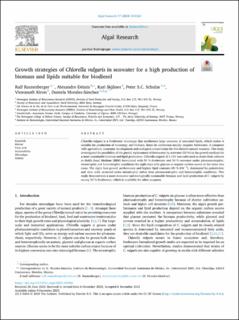Growth strategies of Chlorella vulgaris in seawater for a high production of biomass and lipids suitable for biodiesel
Rautenberger, Ralf; Détain, Alexandre; Skjånes, Kari; Schulze, Peter S. C.; Kiron, Viswanath; Morales-Sánchez, Daniela
Peer reviewed, Journal article
Published version

View/
Date
2023Metadata
Show full item recordCollections
Original version
Rautenberger, R., Détain, A., Skjånes, K., Schulze, P. S. C., Kiron, V. & Morales-Sánchez, D. (2024). Growth strategies of Chlorella vulgaris in seawater for a high production of biomass and lipids suitable for biodiesel. Algal Research, 77: 103360. doi: 10.1016/j.algal.2023.103360Abstract
Chlorella vulgaris is a freshwater microalga that synthesises large amounts of saturated lipids, which makes it suitable for production of bioenergy and biofuels. Since its cultivation usually requires freshwater, it competes with agriculture, economic development and ecological conservation for this limited natural resource. This study investigated the possibility of the partial replacement of freshwater by seawater (50 %) in the growth medium for a more sustainable biomass and lipid production. Chlorella vulgaris 211-11b was cultivated as shake-flask cultures in Bold's Basal Medium (BBM) formulated with 50 % freshwater and 50 % seawater under photoautotrophic, mixotrophic and heterotrophic conditions for eight days with glucose as organic carbon source in the latter two cases. The alga's best growth performance and highest lipid contents (49 % DW−1), dominated by palmitioleic and oleic acid, occurred under mixotrophic rather than photoautotrophic and heterotrophic conditions. This study demonstrates a more economic and ecologically sustainable biomass and lipid production of C. vulgaris by saving 50 % freshwater, which is available for other purposes. Growth strategies of Chlorella vulgaris in seawater for a high production of biomass and lipids suitable for biodiesel
